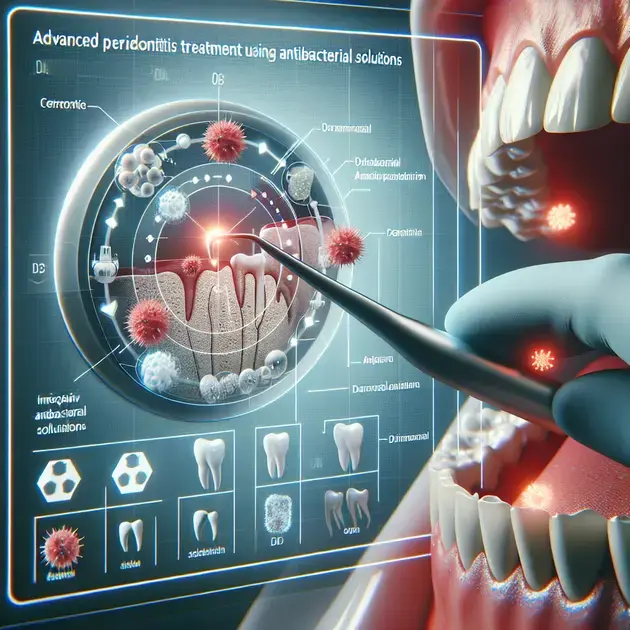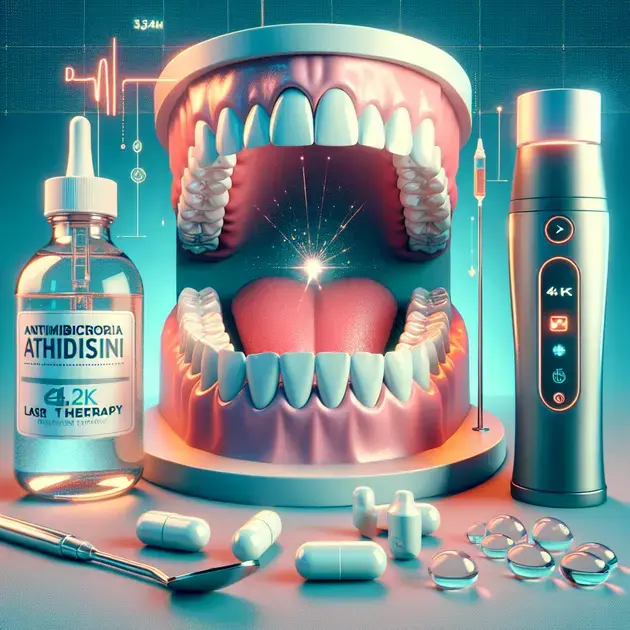Periodontitis is a common and serious gum infection that damages the soft tissue and can destroy the bone that supports teeth. In this comprehensive guide, we will explore the most effective medications for periodontitis, providing up-to-date information on treatment options.
From antibiotics to antimicrobial mouth rinses, there are various medications available to help combat periodontitis and promote oral health. Understanding the different options and how they work is essential in effectively managing this condition.

Understanding Effective Medications for Periodontitis
Periodontitis is a serious gum infection that damages the soft tissue and destroys the bone that supports your teeth. Understanding the effective medications for periodontitis is crucial in managing the condition and preventing further damage. One of the most common medications prescribed for periodontitis is antibiotics. These medications can help control and reduce the bacterial infection in the gums.
To explore effective medications for periodontitis, you can refer to reputable sources such as the American Academy of Periodontology (AAP) website. The AAP provides detailed information on different antibiotics used in periodontal treatment, their dosage, and potential side effects. It is important to consult with a dental professional before starting any medication for periodontitis.
Another important aspect of treating periodontitis is using antimicrobial mouth rinses. These rinses contain active ingredients that help reduce plaque and control bacterial growth in the mouth. Some popular antimicrobial mouth rinses include Listerine and Colgate Total. These rinses can be used as part of your daily oral hygiene routine to help manage periodontitis.
In addition to antibiotics and antimicrobial mouth rinses, there are also advanced treatment options available for periodontitis. Surgical procedures such as flap surgery and bone grafting may be recommended for severe cases of periodontitis. These treatments aim to restore the health of the gums and prevent further progression of the disease.
Overall, understanding the effective medications for periodontitis and exploring different treatment options is essential for maintaining good oral health. By following a comprehensive treatment plan prescribed by a dental professional and incorporating proper oral hygiene practices, you can effectively manage periodontitis and preserve your smile.
Exploring Antibiotics and Antimicrobial Mouth Rinses
When it comes to exploring antibiotics and antimicrobial mouth rinses for periodontitis, it is important to understand how these medications work in combating gum infections. Antibiotics such as doxycycline and metronidazole are commonly used to reduce the bacteria causing periodontitis. These medications can be prescribed by a dentist or periodontist after a thorough evaluation of your condition.
To find more information on antibiotics and antimicrobial mouth rinses, you can visit the Centers for Disease Control and Prevention (CDC) website. The CDC provides guidelines and recommendations for using antibiotics in dental procedures, including the treatment of periodontitis. It is crucial to follow the prescribed dosage and duration of antibiotics to ensure their effectiveness.
Antimicrobial mouth rinses containing chlorhexidine or essential oils can also play a significant role in controlling plaque and reducing inflammation in the gums. These rinses are available over the counter and can be used as an adjunct to regular brushing and flossing. Incorporating antimicrobial mouth rinses into your oral hygiene routine can help improve the overall health of your gums.
Exploring different antibiotics and antimicrobial mouth rinses for periodontitis treatment requires guidance from a dental professional. Your dentist can evaluate your oral health condition and recommend the most suitable medications based on your specific needs. By following their advice and maintaining good oral hygiene practices, you can effectively manage periodontitis and prevent complications.
Maximizing Treatment Options for Periodontitis
Maximizing treatment options for periodontitis involves a comprehensive approach to managing the condition and preventing its progression. In addition to antibiotics and surgical procedures, there are several non-surgical treatments available for periodontitis, such as scaling and root planing. This deep cleaning procedure helps remove plaque and tartar buildup from the teeth and gums.
To learn more about maximizing treatment options for periodontitis, you can explore resources like the Mayo Clinic website. The Mayo Clinic offers valuable insights into the different treatment modalities for periodontitis, including the benefits and potential risks associated with each option. It is essential to work closely with your dental provider to determine the most effective treatment plan for your individual case.
Another advanced treatment option for periodontitis is laser therapy, which uses focused light energy to remove inflamed gum tissue and kill bacteria. This minimally invasive procedure can help reduce gum inflammation and promote tissue regeneration. Laser therapy is often used in conjunction with traditional periodontal treatments to achieve optimal results.
By maximizing treatment options for periodontitis and exploring innovative approaches to oral care, you can improve the health of your gums and prevent complications associated with the disease. Regular dental check-ups, proper oral hygiene practices, and adherence to the prescribed treatment plan are essential steps in effectively managing periodontitis and maintaining a healthy smile.

Maximizing the Efficacy of Periodontitis Medications
One crucial aspect of managing periodontitis effectively is maximizing the efficacy of the medications prescribed by your dentist or periodontist. To achieve this, it is essential to follow your healthcare provider’s instructions meticulously. This includes taking the prescribed medications at the designated times and for the recommended duration.
In addition to proper adherence to medication schedules, it is also important to maintain good oral hygiene practices. Brushing and flossing regularly can help ensure that the medications reach their intended targets in the gum tissues, where the bacteria causing periodontitis reside.
Another strategy for maximizing medication efficacy is to avoid certain lifestyle habits that can interfere with the treatment process. For example, smoking tobacco can significantly reduce the effectiveness of periodontitis medications. By quitting smoking or using tobacco products, you can enhance the impact of the prescribed medications.
Furthermore, it is advisable to schedule regular follow-up appointments with your dental healthcare provider to monitor the progress of your periodontal treatment. During these visits, your provider can assess the efficacy of the medications and make any necessary adjustments to ensure optimal results.
By combining proper medication adherence, good oral hygiene practices, avoidance of harmful habits like smoking, and consistent follow-up appointments, you can maximize the efficacy of periodontitis medications and improve the health of your gums.
Nurturing Oral Health with Specialized Antibacterial Care
Specialized antibacterial care plays a crucial role in nurturing oral health, particularly in managing conditions like periodontitis. These targeted treatments are designed to combat the specific bacteria responsible for gum disease and promote healing in the affected gum tissues.
One common form of specialized antibacterial care is the use of antimicrobial mouth rinses prescribed by dental professionals. These rinses contain active ingredients that help kill the bacteria causing periodontitis, reducing inflammation and promoting gum health.
In addition to mouth rinses, dental providers may also recommend localized antibiotics or antimicrobial gels to target stubborn infections in the gum pockets. These treatments can penetrate deep into the gum tissue to eradicate bacteria and support the healing process.
For more severe cases of periodontitis, advanced therapies such as laser bacterial reduction or photodynamic therapy may be recommended. These innovative approaches utilize cutting-edge technology to deliver targeted antibacterial care and accelerate the healing of gum tissues.
Ultimately, nurturing oral health with specialized antibacterial care involves a personalized approach tailored to the individual’s specific needs. By working closely with your dental provider and following their recommendations, you can effectively manage periodontitis and promote overall gum health.
Customized Approaches for Managing Periodontitis
When it comes to managing periodontitis, a one-size-fits-all approach is not sufficient. Customized treatment plans tailored to each patient’s unique condition and needs are essential for achieving optimal outcomes in gum disease management.
One key aspect of customized periodontal care is the thorough evaluation of the patient’s oral health status, including the extent of gum disease, presence of underlying conditions, and individual risk factors. This comprehensive assessment forms the basis for developing a personalized treatment plan.
Based on the specific findings of the oral health evaluation, dental providers can recommend a combination of therapies to address the various aspects of periodontitis. These may include deep cleaning procedures like scaling and root planing, surgical interventions, and adjunctive treatments such as antibiotic therapy.
Regular monitoring and disease progression tracking are integral parts of customized periodontal care. By regularly assessing the response to treatment and making adjustments as needed, dental providers can ensure that the patient’s gum health is effectively managed over time.
By embracing customized approaches for managing periodontitis, patients can benefit from tailored care that addresses their unique oral health needs and maximizes the effectiveness of treatment interventions. This personalized approach fosters better outcomes and long-term gum health sustainability.
Conclusion
In conclusion, maximizing the efficacy of periodontitis medications is crucial for effective management of gum disease. By diligently following healthcare provider’s instructions, maintaining good oral hygiene practices, and avoiding habits like smoking, individuals can enhance the impact of prescribed medications and improve gum health. Regular follow-up appointments with dental providers play a vital role in monitoring treatment progress and making necessary adjustments for optimal results. Combining medication adherence, oral hygiene, lifestyle changes, and consistent follow-ups can significantly maximize the effectiveness of periodontitis medications.
Furthermore, nurturing oral health with specialized antibacterial care is essential in combating the specific bacteria causing gum disease. From antimicrobial mouth rinses to localized antibiotics and advanced therapies like laser bacterial reduction, personalized approaches tailored to individual needs can accelerate the healing process and promote overall gum health. Collaborating closely with dental providers and adhering to their recommendations are key in effectively managing periodontitis.
Customized approaches for managing periodontitis highlight the importance of tailored treatment plans based on thorough oral health evaluations. By addressing the unique conditions and risk factors of each patient, dental providers can recommend a combination of therapies to target different aspects of gum disease. Regular monitoring and disease progression tracking ensure that the patient’s gum health is effectively maintained over time, leading to better outcomes and long-term sustainability. Embracing personalized care fosters improved results and overall well-being for individuals dealing with periodontitis.



